John Ross Ferrara / Tuesday, Oct. 26, 2021 @ 12:30 p.m. / Community, Local Government
Brookings City Council Unanimously Votes to Limit Churches to Feeding the Hungry Two Days a Week In Attempt to Skirt Neighborhood’s Homeless Problem
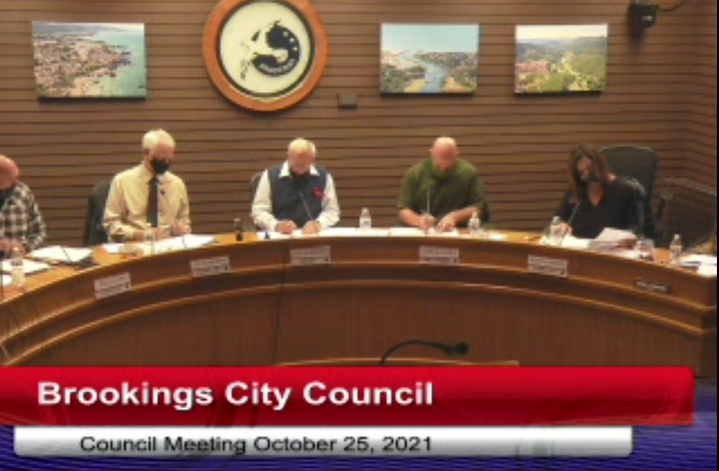
The Brookings City Council at last night's meeting. | City of Brookings
PREVIOUSLY: Brookings City Council to Decide Whether or Not to Limit Churches to Feeding the Hungry Only Two Days a Week
###
The City of Brookings is so eager to remove the homeless from its Azalea Park neighborhood that City Council members unanimously voted last night to limit how many days a week local churches can feed the hungry.
The action was part of the city’s months-long plan to disperse the roughly 70 homeless people that have gathered around St. Timothy’s Episcopal Church at 401 Fir Street for free meals six days a week during the pandemic. Father Bernie Lindley of St. Timothy’s was in attendance at last night’s meeting, and told the Outpost that the church plans to ignore the city council’s orders and immediately take legal action if any fines are imposed.
“When we are fined for being in noncompliance, that very day, we will be filing a suit against the city for violating our constitutional right to freely exercise our religion,” Lindley said. “We have the support of our bishop and our entire diocese.”
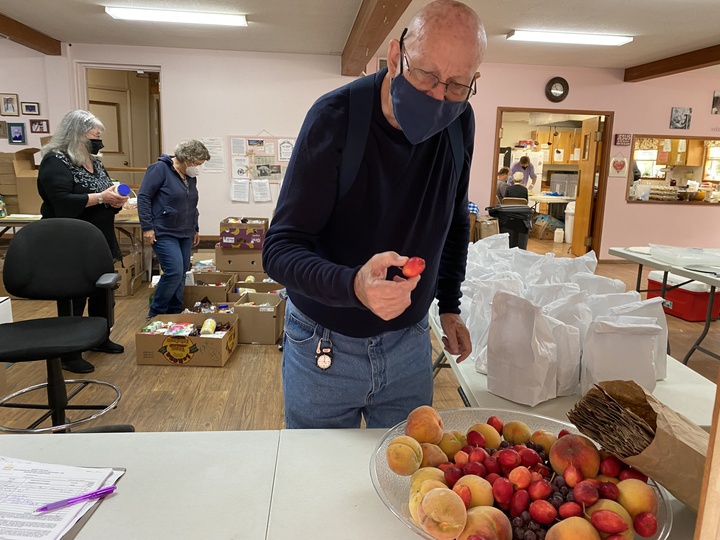
Photos of St. Timothy's kitchen ministry provided by Father Bernie Lindley.
St. Timothy’s is the predominant member of the Brookings-Harbor Community Kitchen Ministry, a small coalition of local churches that currently provides freshly cooked meals to the needy seven days a week. While Brookings Presbyterian, Star of the Sea Catholic Church, Trinity Lutheran and Smith River United Methodist are all involved in the ministry, St. Timothy’s currently handles a majority of the work, hosting four of the seven meals served each week.
By amending a subsection of the city’s municipal land development code, councilmembers mandated that all charitable organizations offering free meals inside the city’s residential areas — like the Brookings-Harbor Community Kitchen Ministry — be required to apply for conditional use permits in order to legally operate as Oregon Health Authority approved “restaurants.”
Through these permits, the city was able to tack individual churches with a number of restrictions, including limiting them to no more than two “benevolent meal services” a week, which may operate for three hours a day, between the hours of 9 a.m and 5 p.m.
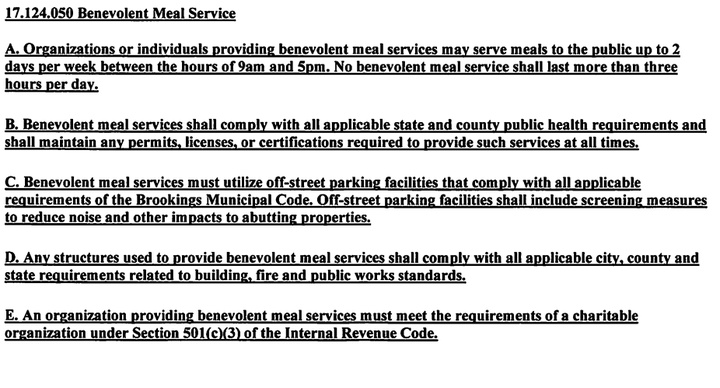
Stipulations for the approved conditional use permits. | City of Brookings
The process of instituting these regulations began in April, when 18 residents living around St. Timothy’s signed a petition titled “Petition to Remove the Homeless From St. Timothy Church.” The document was presented to the Brookings City Council at a workshop meeting in June, and cited a number of concerns with the homeless people congregating around the church, including criminal trespassing, theft, harassment, drug possession, littering, disorderly conduct, physical altercation and child abuse.
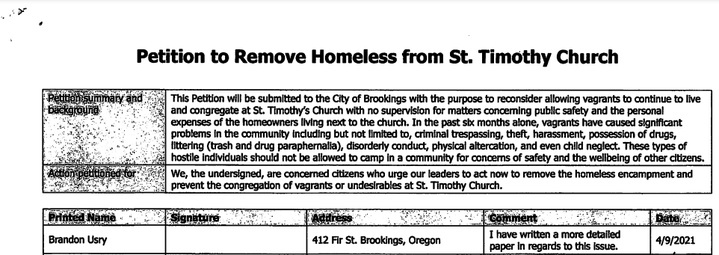
A portion of the petition. | City of Brookings
While the city hopes that the conditional use permits will alleviate some of these concerns by dispersing its homeless population throughout the town, rather than having one church serve as a primary food source, Lindley said that abiding by these restrictions would currently create a gap where Brookings homeless community would go hungry for two days a week.
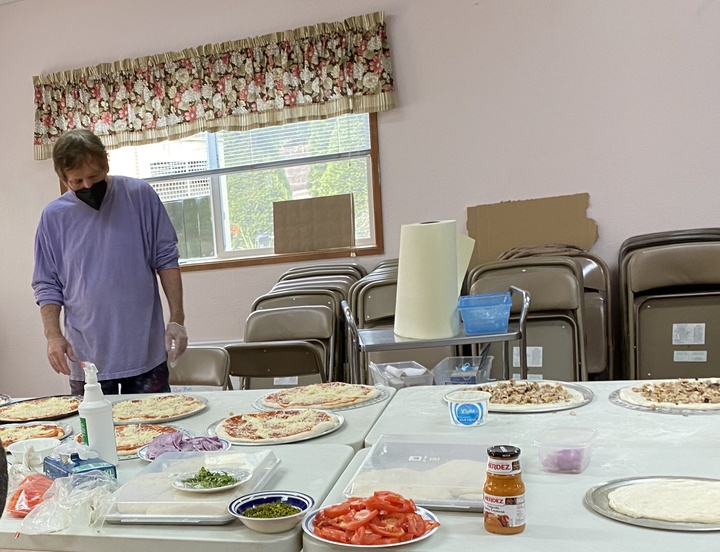
“The whole point behind this is to have a prepared meal for people every day,” Lindley told the Brookings Planning Commission earlier this month. “We’re talking about folks that do not have the ability to prepare their own meals. They live in a car, or they live in the bushes somewhere. They don’t have a refrigerator, they don’t have a stove. Even if they go in to get food from the food bank, they can’t prepare it, they can’t store it in any way.”
It’s also unclear how effective the city’s plan will be at dispersing the homeless population, as a majority of the churches within the ministry are located less than a half-mile away from Azalea Park.
Executive Director of the Brookings CORE Response Diana Cooper, who earlier that evening received the 2021 Community Health Worker Group award from the American Public Health Association for her work helping struggling community members get access to basic resources like food and healthcare, also spoke out against the ordinance at last night’s meeting.
“The city council believes their decision is necessary and they wrongly assume that we don't understand. We do,” Cooper told the Outpost. “They are completely clueless about the state of their own community. They don't even understand how many churches are feeding and when, nor do they understand the relationship between resource insecurity and criminality. It is my strong feeling that this city council is allowing their preconceived bias and fear control the outcome of their vote and it will cost the city and taxpayers greatly through lawsuits and continued lack of services. The lack of resources has already cost us many lives.”
At least one member of the city council did seem to be unfamiliar with how the new ordinance would affect the kitchen ministry. Councilmember Brad Alcorn inaccurately stated at last night’s meeting that free meals are already provided to Brookings residents “eight days a week” — possibly not taking into account that the new ordinance would cut two days of meals service from St. Timothy’s schedule.
Mayor Ron Hedenskog, who was previously involved in the kitchen ministry, expressed a desire to meet the needs of the city’s homeless population, as well as the needs of the residents living near the ministry kitchens.

Mayor Ron Hedenskog. | City of Brookings
“This is dear to my heart,” Hedenskog said. “We have a neighborhood complaining and we have a dual purpose here. This is to strike a balance.”
Hedenskog went on to vilify the media for the community’s reaction to the council’s plans to restrict the kitchen ministry.
“We haven’t had any help from the media whatsoever,” he said. “There is nobody on this council that has made an attack on St. Timothy’s whatsoever. It's not because we're all wicked. It’s because we're meeting needs [to serve] a dual purpose. There are other ways to explain what’s going on without vilifying the city council. People don’t understand our staff doesn’t have a political opinion. I’m upset over this. I’ve been upset over it for weeks. There has never been a statement from this council or staff about shutting down benevolent kitchens. We’re looking to strike an equilibrium.”
St. Timothy’s Deacon Linda Lee also spoke at list night’s meeting and invited the city council members to have lunch at the church’s community kitchens before making a decision.
“I only have one thing to add,” Lee told the council. “For all your concerns and desires for a new ruling, which you think will benefit your town, not one of [you], except for Mayor Hedenskog, has come to visit St. Timothy’s to receive a tour and meet those we serve.”
After the city council passed the ordinance, it also adopted a second ordinance giving the churches a three-month grace period to apply for the conditional use permits free of charge.
It is unclear how the city will respond if any churches fail to comply with the new regulations. However, based on a number of strongly- worded letters sent to the City of Brookings earlier this month by the kitchen ministry’s churches and their diocese, St. Timothy’s has support for its planned civil disobedience.
“The city’s proposal fails to consider rights afforded churches under the United States and Oregon Constitutions and its own municipal code,” Right Reverend Diana Akiyama of the Episcopal Diocese of Oregon wrote to the City of Brookings earlier this month. “Moreover, it is premised upon a broad and incorrect understanding of the term 'restaurants,' under Oregon statutes and administrative rules. The proposal ordinance also utterly fails the city’s responsibility to its own citizens who are among the homeless. It is therefore unlawful, arbitrary and capricious, inconsistent with religious and community standards and fails to consider the unintended consequences of the flawed proposal.”
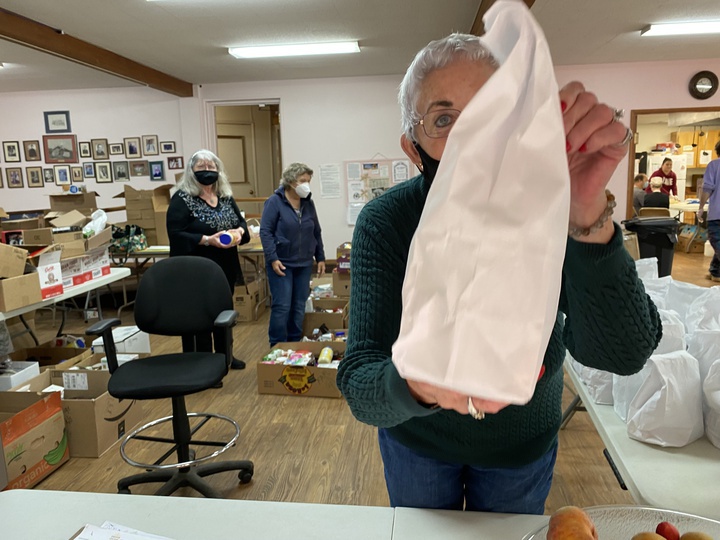
CLICK TO MANAGE